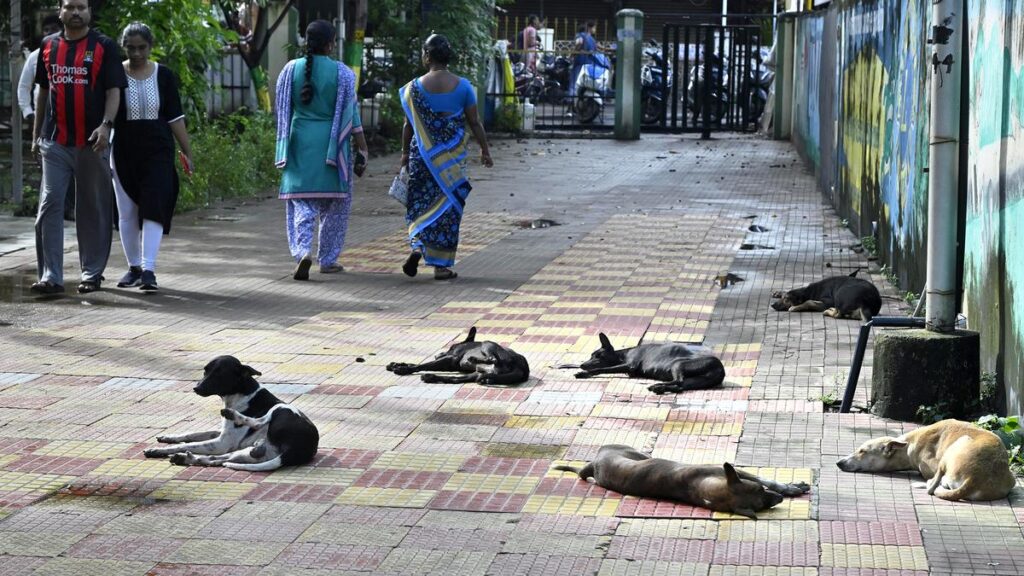
According to officials of the Public Health Department of the GCC, over 17,000 dog bite cases — involving both domestic and community dogs — are reported every year
| Photo Credit: M. Vedhan
The Tamil Nadu government will hold meetings with officials of the Municipal Administration and Water Supply (MAWS) and Animal Husbandry Departments over the stray dog problem in the State and come up with methods besides animal birth control to check their rising population.
Amid growing concerns, Health and Family Welfare Minister Ma. Subramanian said a meeting with the departments would be conducted after the State’s Budget presentation.
According to officials of the Public Health Department of the GCC, over 17,000 dog bite cases — involving both domestic and community dogs — are reported every year.
GCC Ward 152 councillor S. Bharathi said it had been nearly two years since the last anti-rabies vaccination drive for stray dogs was conducted. “They scavenge through garbage, scattering waste and posing a health hazard for residents. This issue will be raised again in the upcoming council meeting,” she added.
Further, A. Krishnan, a resident of East Tambaram, alleged that packs of ferocious dogs were often seen chasing locals, especially at night. “Instead of discharging the animals back to the areas after animal birth control, they must be impounded,” he said. Impounding is a process of confining dogs to a public enclosure.
Both GCC and Tambaram Corporation authorities, however, said permanent sheltering of stray dogs could not be taken up due to certain provisions under the Prevention of Cruelty to Animals Act and the Animal Birth Control (ABC) Rules 2023. They noted that even if civic bodies were allowed to impound them, there could be heavy backlash from animal lovers and rights activists.

Humane intervention
Citing urbanisation as the cause for a lack of spaces for animals to wander, a volunteerof an animal shelter, said that just as humans wanted their fears and concerns respected, those of animals too must be considered. “People were not against stray animals on the streets previously. Around 50-60 years ago, when Koyambedu had several green and open spaces, people and animals coexisted.”
“Now, there are many accidents and unpleasant incidents taking place on roads. People have not stopped travelling due to that and navigate through the risks. Therefore, seeking isolation [exemption] from ABC Rules of the Centre alone is not fair,” she added.
Sarah Iyer, founder of Madras Animal Rescue Society, said that to strike a balance, the public, GCC, and animal lovers must meet each other halfway. She maintained that neutering must be done on a war footing to break the reproduction cycle.

“Adoption must be pushed by the government rather than sheltering. If existing stray dogs need to be impounded, NGOs can be pooled in for temporary or permanent sheltering of dogs. For example, I can take care of old blind and paraplegic dogs. Some NGOs can take care of abandoned breeds, another for mothers and puppies, yet another for young dogs, and so on. Some NGOs specialise in training and calming dogs that are deemed ferocious. Funds should be used to help NGOs secure space, infrastructure, and most importantly, maintain these facilities. The kennels in GCC’s ABC centers are already full. The kennels must not be overcrowded, as one sick dog can impact the health of an entire group, leading to negative consequences,” she said.
There has to be a balance in resolving this man-animal conflict humanely, but impounding dogs may not be a solution, she added.

Civic authorities state that in case of dog bites or complaints of ferocious dogs, the particular animal is captured, kept under observation for 10-15 days, and released after the approval of ratification and internal committees. “They are otherwise treated by veterinarians at the ABCs depending on their condition. If impounding is in place, people may deem even docile dogs as ferocious, which will also make issues more complicated. The matter has to be decided by the Central government,” they said.
Published – February 15, 2025 03:23 pm IST
Source:https://www.thehindu.com/news/national/tamil-nadu/tn-govt-to-discuss-methods-to-control-stray-dog-population/article69212230.ece

